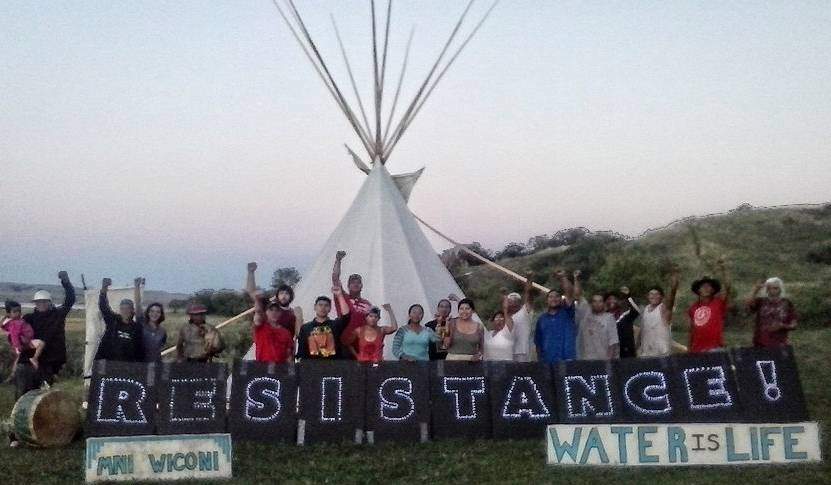
This is part two of a seven-part series produced in partnership with Grist as a companion to the SLAPP’d season of the Drilled podcast. You can see all seven pieces together in a beautiful layout over on Grist’s site, where you’ll also find other great climate stories.
In February 2017, as security forces prepared to evict water protectors from their camps, TigerSwan — a private security firm contracted by Energy Transfer — began emailing with the law firm Gibson, Dunn, & Crutcher.
The firm had been representing Energy Transfer as it attempted to convince a federal court to dismiss the Standing Rock Sioux Tribe’s claims against the Army Corps. Gibson, Dunn, & Crutcher would eventually declare victory against Greenpeace in the $666 million lawsuit.
TigerSwan had spent months spying on water protectors by monitoring social media feeds, listening in on radio communications, flying drones, and monitoring camps by helicopter. It sent infiltrators — people pretending to be water protectors — into the anti-pipeline camps to gather information. Founded in 2008 by a former commander of an elite special operations unit known as Delta Force, TigerSwan’s security contractors had cut their teeth during the wars in Afghanistan and Iraq. At Standing Rock, it brought those “war-on-terror” tactics home.
Files obtained through a public records request reveal that TigerSwan was not only providing the intelligence it collected to law enforcement, but it was also preparing to provide some of the information it gathered on water protectors to the law firm Gibson Dunn, including a set of spreadsheets listing crowdfunding pages, how much each had raised, and who was involved, as well as spreadsheets matching protest actions with individual water protectors, labeled “named conspirators.” The company asked one of its infiltrators to identify what groups pipeline opponents belonged to. And it asked another contractor to send over the makes and models of vehicles that showed up at certain protests.
That record request also revealed a purpose of the communications between TigerSwan and Gibson Dunn: a RICO lawsuit. Gibson Dunn was considering using the Racketeer Influenced and Corrupt Organizations Act, or RICO — a law originally developed to go after the mafia — to target anti-pipeline activists and organizers, and had turned to Energy Transfer’s mercenary private security firm, TigerSwan, to help. TigerSwan did not respond to a request for comment.
Months later, in August of 2017, Deepa Padmanabha, the senior legal advisor for Greenpeace in the U.S., learned that Energy Transfer was suing the environmental organization in federal court, alleging violations of the RICO Act. “This one came as a very big surprise just because the Greenpeace entities had such little involvement with anything associated with Standing Rock,” she said.
Padmanabha called it a SLAPP suit — a Strategic Lawsuit Against Public Participation — which is designed not necessarily to win, but to drain opponents of resources and discourage them from speaking out. SLAPP suits are meant to set an example, and when successful they can be extremely effective.
Gibson Dunn is known to excel at aggressive lawsuits. The firm also has a history of helping big corporations avoid accountability for harming the environment or undermining Indigenous peoples' rights — including arguing to gut the Indian Child Welfare Act in 2023.
In 2007, banana workers in Nicaragua won a multimillion-dollar lawsuit in the U.S. against the Dole fruit company for poisoning them with a pesticide called DCBP. To combat the win, Dole hired Gibson Dunn. They alleged a vast conspiracy in which the banana workers’ attorney had recruited fake banana workers to go after the fruit company. There were multiple holes in the story that later came to light, but to the American judge who presided over the conspiracy case, it didn’t matter: The money awarded to the workers was taken back.
Dole’s general counsel at the time gave the strategy a name: the “kill step.”
The kill step worked by not only targeting the plaintiffs, but also going after their lawyers, supporters, and media. It destroyed the story being told and replaced it with a new one. Perhaps the most well-known application of the kill step by the law firm was for Chevron. In Ecuador, the homelands of several tribes, including the Cofan, Secoya, and Kichwa, had been contaminated by abandoned pits of oil waste, and in 2011, they won an $18-billion lawsuit, holding the oil giant Chevron accountable. The settlement was reduced by the Ecuadorean Supreme Court to $9.5 billion in 2013. Chevron, in turn, filed a RICO complaint in the U.S. against the lawyers who argued the case, including attorney Steven Donziger, claiming that they had contaminated witnesses, behaved unethically, and maybe even bribed a judge.
There were a number of issues with Chevron’s case, but the company won. Over the next few years, Chevron and Gibson Dunn kept going after Donziger. He ended up on house arrest for two years and in jail for 45 days for a contempt of court charge. Meanwhile, the oil is still contaminating water in the Ecuadorian Amazon — and, like the banana workers in Nicaragua, the Ecuadorians still haven’t been able to collect the settlement awarded to them.
When Padmanabha got word Greenpeace was being sued, she wasn’t just confused as to why the organization was being sued, she was also confused by the timing. Oil was already flowing through the Dakota Access pipeline — the company had gotten what it wanted. But there was a clue: “We were already dealing with another massive SLAPP suit filed in federal court.”
In 2016, before Standing Rock, a law firm called Kasowitz Benson Torres had filed a RICO suit against Greenpeace on behalf of a timber company called Resolute Forest Products. The lawsuit claimed that Greenpeace Canada’s anti-logging campaign, which targeted Resolute, amounted to racketeering, defamation, and tortious interference. In 2017, the Kasowitz law firm filed a second lawsuit against Greenpeace, this time on behalf of Energy Transfer.
“The complaints looked very similar,” said Padmanabha. “It was the same allegations of a RICO conspiracy, and it was the same attempt to scare us into silence and bankrupt us.”
Ultimately, the RICO suit didn’t live long. A federal judge dismissed it in the winter of 2019, writing: “This is far short of what is needed to establish a RICO enterprise.” But Energy Transfer quickly filed a new version of the lawsuit in North Dakota state court, using local conspiracy law to tie the claims together.
Gibson, Dunn, & Crutcher would eventually take over the case. In a statement, a spokesperson for Kasowitz, Shannon O'Reilly, wrote: “The firm spearheaded Energy Transfer’s suits against those who wrongfully targeted these projects, and we are gratified that Energy Transfer ultimately achieved such a successful result.”
In the North Dakota iteration, the lawsuit’s primary targets were Greenpeace, two individual pipeline opponents named Cody Hall and Krystal Two Bulls, and a group called the Red Warrior Society. All were accused of conspiring together to propel the anti-pipeline movement. The company also alleged that the conspiracy was spread throughout Greenpeace-affiliated organizations, including Greenpeace Inc., which carries out U.S. based campaigns; Greenpeace Fund, also based in the U.S., which raises money for certain Greenpeace efforts; and Amsterdam-based Greenpeace International, which licenses out the Greenpeace name to independently operated nonprofits around the world and coordinates some of their activities.
The lawsuit included three buckets of claims. There were on-the-ground, protest-related damages for things like trespassing and destruction of construction equipment. There were defamation claims, alleging that Greenpeace and the other defendants lied by accusing Energy Transfer of deliberately desecrating sacred sites and putting the pipeline on tribal lands, and accusing police and private security of being violent toward nonviolent water protectors. And finally, Energy Transfer alleged tortious interference — essentially, that those defamatory statements damaged the company’s relationship with banks.
Those accused weren’t the only ones impacted by the lawsuit. Subpoenas went out demanding people and organizations hand over documents or testify in front of lawyers. Energy Transfer subpoenaed Water Protectors Legal Collective, a group that provided legal support to pipeline opponents, and Unicorn Riot, a media collective that broadcast hours of footage of police violence. It also subpoenaed Standing Rock’s former tribal historic preservation officer Tim Mentz. Across the water protector community, fear began to spread that anyone and everyone could be dragged into the lawsuit.
However, two people at the heart of the case — Greenpeace’s alleged co-conspirators Cody Hall and Krystal Two Bulls — never received official notification of the lawsuit. Months went by, then years. In legal filings, Energy Transfer said they’d attempted to serve Hall at a home in South Dakota where his parents lived briefly a decade before, but the knock Hall expected at his door didn't come. At one point, Hall got so stressed about it he called Energy Transfer. “I said, ‘You guys say you can’t serve me. I’m sitting here at home. Serve my ass. So what the hell is this bullshit?’” A receptionist took his number but he never heard back.






